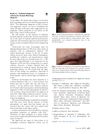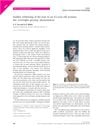 81 citations,
July 2011 in “Lasers in Medical Science”
81 citations,
July 2011 in “Lasers in Medical Science” The Lexington LaserComb helped regrow hair in mice with a condition similar to human hair loss.
 51 citations,
January 2004 in “Skin Pharmacology and Physiology”
51 citations,
January 2004 in “Skin Pharmacology and Physiology” The document explains hair growth and shedding, factors affecting it, and methods to evaluate hair loss, emphasizing the importance of skin biopsy for diagnosis.
 7 citations,
February 2010 in “Journal of Dermatological Treatment”
7 citations,
February 2010 in “Journal of Dermatological Treatment” Imiquimod cream can rarely cause temporary hair loss.
 6 citations,
November 2007 in “Archives of Disease in Childhood: Education & Practice”
6 citations,
November 2007 in “Archives of Disease in Childhood: Education & Practice” The document concludes that accurate diagnosis of alopecia in children relies on thorough examination and history, and while treatments exist, none can alter the course of alopecia areata, which can significantly affect a child's psychological well-being.
 4 citations,
July 1996 in “Annals of Internal Medicine”
4 citations,
July 1996 in “Annals of Internal Medicine” High doses of fluconazole can cause reversible hair loss.
 January 2025 in “TURKDERM”
January 2025 in “TURKDERM” Alopecia areata incognito in children can be effectively treated with triamcinolone acetonide and supplements, leading to full hair regrowth.
 12 citations,
January 1984 in “Anesthesia & Analgesia”
12 citations,
January 1984 in “Anesthesia & Analgesia” Anesthesia and surgery can cause temporary hair loss, but hair usually grows back without treatment.
 June 2023 in “British journal of dermatology/British journal of dermatology, Supplement”
June 2023 in “British journal of dermatology/British journal of dermatology, Supplement” A woman's rare hair loss condition improved on its own, suggesting this type might recover like common cases.
 29 citations,
March 2001 in “Clinics in Dermatology”
29 citations,
March 2001 in “Clinics in Dermatology” Steven Kossard classified lymphocyte-related hair loss into four patterns, each linked to different types of baldness.
 14 citations,
January 2015 in “Skin appendage disorders”
14 citations,
January 2015 in “Skin appendage disorders” Minoxidil treatment for hair loss can cause scalp allergy and severe hair loss.
 7 citations,
October 2019 in “Klinická onkologie”
7 citations,
October 2019 in “Klinická onkologie” Cancer treatments often cause hair loss and damage, affecting patients' mental health.
 1 citations,
July 2018 in “Elsevier eBooks”
1 citations,
July 2018 in “Elsevier eBooks” Alopecia Areata is an autoimmune hair loss condition, with various treatments showing mixed effectiveness and no guaranteed cure.
 1 citations,
March 2014 in “Senses and Sciences”
1 citations,
March 2014 in “Senses and Sciences” A supplement with Serenoa repens improved hair loss in a patient.
 1 citations,
June 2007 in “Journal of Oral and Maxillofacial Surgery”
1 citations,
June 2007 in “Journal of Oral and Maxillofacial Surgery” A woman experienced temporary hair loss after jaw surgery due to the stress of the operation.
 56 citations,
January 2013 in “International journal of trichology”
56 citations,
January 2013 in “International journal of trichology” Zinc supplements may be needed to treat hair loss in hypothyroidism.
 24 citations,
September 1985 in “Journal of The American Academy of Dermatology”
24 citations,
September 1985 in “Journal of The American Academy of Dermatology” The report suggests a possible link between hair loss and hidden scalp tumors but states more evidence is needed to confirm this.
 8 citations,
December 2017 in “Journal of The American Academy of Dermatology”
8 citations,
December 2017 in “Journal of The American Academy of Dermatology” The authors updated the criteria for diagnosing frontal fibrosing alopecia, making it easier to diagnose without a biopsy.
 3 citations,
April 2012 in “Osteoporosis International”
3 citations,
April 2012 in “Osteoporosis International” A woman experienced hair loss after taking strontium ranelate for osteoporosis.
 July 2022 in “Singapore Medical Journal”
July 2022 in “Singapore Medical Journal” Most children with alopecia areata improved with treatment, but those with more hair loss had worse outcomes.
 October 2024 in “Annals of Allergy Asthma & Immunology”
October 2024 in “Annals of Allergy Asthma & Immunology” Anaphylaxis from cow's milk allergy can cause temporary hair loss in children.
 8 citations,
January 2022 in “Cureus”
8 citations,
January 2022 in “Cureus” A man's hair grew back to almost normal 7 months after COVID-19 without needing treatment.
 2 citations,
May 2022 in “JAAD Case Reports”
2 citations,
May 2022 in “JAAD Case Reports” A woman lost all her hair after mild COVID-19, but it started to regrow after treatment with a specific medication.
 4 citations,
May 2022 in “Frontiers in Medicine”
4 citations,
May 2022 in “Frontiers in Medicine” About 11% of patients with secondary syphilis had Syphilitic Alopecia, which usually improved with treatment.
 June 2023 in “Annals of the College of Medecine”
June 2023 in “Annals of the College of Medecine” Low iron levels are linked to more hair loss in women with chronic hair shedding.
 9 citations,
January 2017 in “International Journal of Trichology”
9 citations,
January 2017 in “International Journal of Trichology” The study suggests that mast cells might be involved in the hair loss condition telogen effluvium and could be a target for treatment.
3 citations,
January 2022 in “Anais Brasileiros De Dermatologia” Androgenetic alopecia in teens is linked to obesity and other metabolic risks, needing early diagnosis and management.
 November 2023 in “Journal of Cosmetic Dermatology”
November 2023 in “Journal of Cosmetic Dermatology” People with non-scarring hair loss often have lower vitamin D levels than those without hair loss.
 August 2023 in “JAAD Case Reports”
August 2023 in “JAAD Case Reports” A woman with lupus experienced hair regrowth after treatment, but hair transplantation is not advised for her condition.
 25 citations,
December 2021 in “Journal of Medical Virology”
25 citations,
December 2021 in “Journal of Medical Virology” COVID-19 can cause a type of hair loss that usually starts 74 days after infection, affecting mostly women, but most patients eventually recover.
 8 citations,
May 2012 in “Clinical and Experimental Dermatology”
8 citations,
May 2012 in “Clinical and Experimental Dermatology” An 82-year-old woman's hair turned white suddenly, likely due to a rare form of alopecia that targets pigmented hair.





























